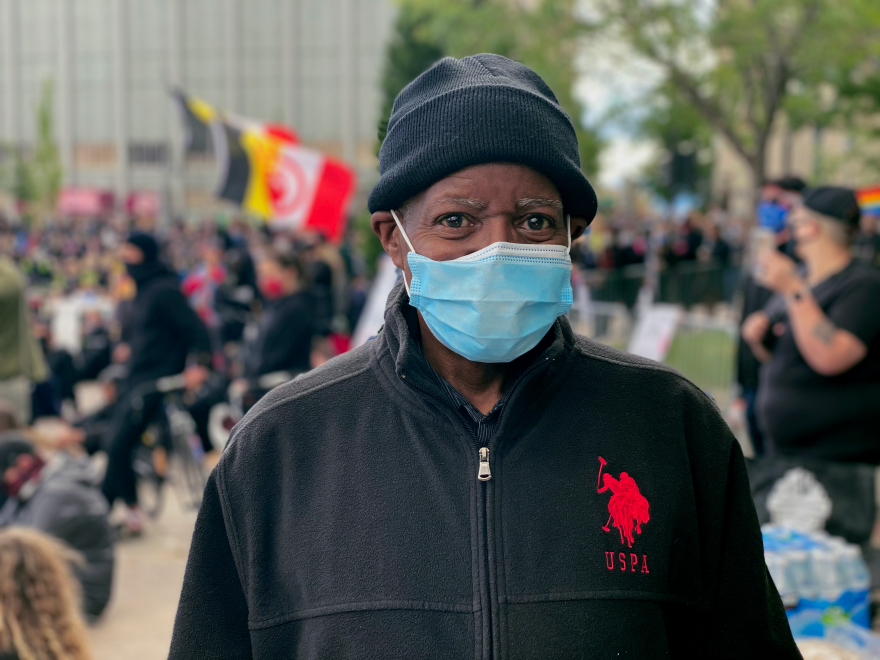Hundreds of people spent their Sunday evening participating in a peace vigil in downtown Reno. Black Lives Matter activists organized the event to allow people to speak, listen, and heal as the community continues to protest against police brutality. KUNR’s Stephanie Serrano was there and has this story.
As a note of disclosure, this story contains mentions of offensive racial slurs.
The rain, wind and hail didn’t stop hundreds of people from showing up at the “Believe” sign in downtown Reno. Chants were loud, voices were raging with anger, but when the sun peeked through the dark gray clouds, a sense of solidarity seemed to emit from those holding up signs that read, ‘Enough is enough’ and questioning ‘How many haven’t been filmed?’
A speaker started off the vigil by yelling the names of many black Americans who lost their lives as victims of police brutality. One of those names was George Floyd, a black man in Minneapolis who died after a white police officer knelt on his neck for more than eight minutes. The opening speech also dismantled the phrase “I don’t see color” and honored every shade of melanin they saw in the crowd.

People chanting “Black Lives Matter” welcomed those in attendance to share their story and Christopher Harris summoned the courage to speak. He’s a 62-year-old man born and raised in LA but a long time Reno resident. He said 32 years ago racial slurs in Reno were an everyday thing.
“I met opposition at times because of the language that particular people would use and how it just flows so easily out of their mouth, but I recognize that it was just ingrained and I realized that it was something that was taught and that is what I realize a lot with racism, it is a taught behavior, even the kids picked it up, thinking anyone could be a nigger not realizing and understanding the ramifications because they’re [a] youth,” Harris said.
Harris spoke about understanding ignorance, as he called it. He said that power lies in reeducating a system that was taught to hate. Harris said that seeing young people at the vigil gave him hope that systemic racism will soon change.

Dorothy Croghan is an 82-year-old woman from North Carolina. At the age of 16, she started working in the cotton fields with the men to pay for college. She earned $5 a day until she had $500 in hand, just enough to enroll in a university.
“The trials and tribulations came but I was God-blessed with perseverance. The first job I went to, it was in the newspaper in Virginia, and I called to make an appointment for the job and they said, ‘yes come on in for the interview.’ I went in there and I sat just about all day long but people went in, and in, all white people. The secretary came out about 5 o’clock and said, ‘gal why are you still sitting here?’ I said ‘I am Dorothy Holloway. I have an appointment for an interview and it was supposed to be at 3 o’clock’ and she said ‘gal we don’t hire niggas here’.” That was Croghan's first attempt at getting a job outside of the cotton fields with a college degree.
Today, decades later, she says that she can’t turn off the TV because watching the protests around the nation and world gives her so much hope that young people will have a life of equality and justice.
While the crowd was led by young people it was also guided by mothers.

Nastassia Montgomery-Sykes is a Reno native with children enrolled in the Washoe County School District.
“I'm speechless. You don’t know what we go through unless you’re a black mother not knowing if your kids are coming home to you if they go out. If they go on a jog. If they’re driving in the car and the police stop them. That’s not okay, at all,” Montgomery-Sykes said.
“My kids have been called niggers just walking down the street, they sit in classrooms where they’re the only African American in class and everyone is looking at them every time it’s Black History Month,” Montgomery-Sykes said. “It's just too much and I don’t want my children to have to go through that. I don't want my grandchildren to have to go through that and generations and generations after that, it's time to stop.”
Along with speeches, there was spoken word. SaMoura Horsley wrote a poem about police injustice nearly five years ago thinking the words would grow to be something of the past, but she was wrong.
Now, in 2020, she presented a new poem, called Black Pride to remind herself why she should be happy that she’s black. Horsley says she faces discrimination every day in the city she was born and raised in, Reno.
“One of the major things that happened was that our neighbors had a confederate flag and then one day them and their friends came over to my family’s yard and they started yelling and calling us the 'n-word' saying they were going to murder us and, you know, nothing was done, from the small scale things to the big things makes a large impact in my life.”
After about four hours of locals denouncing hate, asking people to get out and vote and calling out police brutality the peace vigil ended with 60 seconds of silence and prayer.









